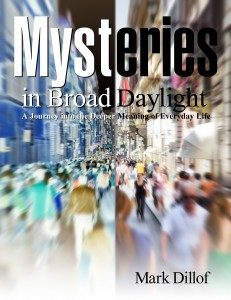Way up there, on the list of life’s most stressful events, is moving, especially if it involves relocating to another city. I’m planning to move, probably this summer, from Binghamton New York — where I’ve lived for a real long time — to Louisville Kentucky. I’ve been facing many of the regrets and anxieties endemic to this major life transition.
It took Hercules a single day to clean the Augean stables. I’ve been cleaning since October, sorting through the plethora of items that I’ve accumulated over the years, deciding what to keep and what to discard. Each object — from an old tennis racket to a pile of love letters, from a ukulele that I never learned to play to the syllabus from a course that I taught long ago — becomes like Proust’s madeleine, evoking a flood of memories, some pleasant and some rather painful.
Sorting through one’s accumulated possessions, in preparation to move, reawakens slumbering ghosts of all sorts, the most powerful of which is the specter of regret. After tormenting us for what we did, it then attacks us for the many more things that we should have done. What, then, can be done? Ideally, this journey backwards in time can effectuate a kind of catharsis, leading to a healing epiphany: one could not be the person one is today had one not been the person that one had been, in all one’s ignorance and foolishness. Thus regrets are burned away through insight into the necessity of error.
Insight doesn’t justify anything, but it allows us to transcend the tragic dimension of our lives — offering peace to our tortured soul — through an enlarged understanding of life. Without exorcising the ghosts of the past, though insight and acceptance, there is a danger that these regrets will follow the moving van to our new abode, taking up residence there. And then we shall be haunted.
The Two Fears
There would appear to be two fears involved with moving. There is the fear of leaving home, severing contact with all that is familiar, indeed of losing one’s world — in the ontological sense — and, therefore, no longer being able to be oneself. This fear of losing oneself is a very fundamental anxiety. This fear of not being a home is the key to that most dreadful experience, which Freud discusses in his essay on the uncanny.
The other fear is of not being able to let go of oneself, of a self that one increasingly suspects of being outmoded. It is the fear that we shall bring our old self with us when we move. What we would take along is the albatross of memories that we would like very much to forget, as well as the habits, routines, outlooks, and ways of seeing that severely limit our horizons. If there is a longing in us for novelty and adventure — if not indeed for self-renewal — then the thought that we are likely to bring ourselves with us, when we move, is a source of both depression and dread.
Of course, to dread that we may bring ourselves with us to the new place requires a certain degree of insight into oneself. One might observe, from experience, that we change jobs but — due to retaining our old attitudes — soon transform our new job into our old job. Thus we find ourselves experiencing the same kind of difficulties with our bosses and coworkers that we had previously experienced. Or we find ourselves in a new relationship, but still have the same sort of conflicts we had in the previous one. To become suspicious of oneself, in this way, therefore requires the ability to identify certain attitudes that make our life what it is, no matter what the circumstance.
Apropos is an episode of the Twilight Zone that sent a chill down my spine. It is about three astronauts who have one heck of a time getting their rock to take off from an alien planet. Finally, they are able to do, to their great relief. Well, their joys soon turn to horror when they realize that they have been deceived; they are still on the alien planet. Here was an image of imagining that one has finally become free of an old place, only to realize that one hasn’t. To extend the metaphor, it is difficult to escape the atmosphere, or the force field, of the world one has created for oneself.
We might also recall the film Cast Away (2000). The protagonist, Chuck Noland (played by Tom Hanks), has his toughest time escaping the pull of the tide surrounding the island, on which he is stranded. That tide is symbolic of our attitudes, beliefs, and worldviews that we must escape, if we are to leave the island of our old self, which has become a prison.
Breaking Free of the Past
Thus, if we are to have a new life, the must come to identify the attitudes that constitute our reality. Furthermore, it requires that we let go of these attitudes. Identifying these attitude requires self-knowledge and letting go of them requires personal power. Both knowledge and power are significant accomplishments.
Obviously, then, simply moving is no substitute for knowledge and power. And yet, moving can lead to self-knowledge, for it can help us to grasp the identity factor amidst the diversity. In this case, the identity factor is our set of attitudes that transform every new place into the same old place. Similarly, were we in a number of relationships, we might better grasp the set of attitudes that we bring to bear in each one, which leads each relationship to be but a variation on a theme.
A second good reason to move is that…
Would you like to read the rest of this insightful
essay? Then download a copy of Mysteries in
Broad Daylight!
Broad Daylight!
Hot off the virtual presses, after four years of intense research and writing! Dr. Mark Dillof has essentially written a detective manual, for those seeking clues to the most perplexing enigmas of everyday life. He initially planned to sell it at seminars, for $75, but a friend recommended making it available to a much larger audience of readers, by offering it as an e-book, for only $9.95. Read more about this amazing new book, at: www.deepestmysteries.com
Or you can…
Download for Barnes & Noble Nook
Mysteries in Broad Daylight contains:
- Powerful essays — like the one you’ve been reading, designed to help you decipher the meaning of everyday life, who you are and what it’s all about.
- Exciting dialogues — they will entertain you, but also make you think deeply about life.
- Exercises and questions designed to teach you the art of uncovering the deep meaning of everything — from the foods we eat to our conflicts at the workplace, from our problems on the golf course to life’s ultimate riddles.
- And much, much more!
Mark Dillof’s new book will awaken you to the mysteries of everyday life. Indeed, it’s likely to expand your consciousness 100fold, illuminate your world and blow your mind!
How much is a life-changing insight worth to you? $1000? $10,000? Priceless? Mysteries in Broad Daylight is overflowing with life-changing insights and all for only $9.99!
Read more about this amazing new book at www.deepestmysteries.com
Mysteries in Broad Daylight will soon be available in paperback, for $19.99.




